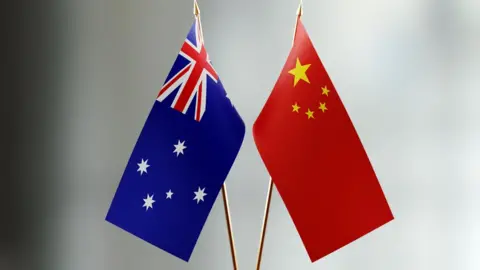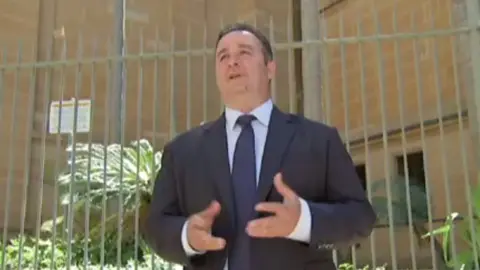Chinese state media accuse Australia of raiding journalists' homes
 Getty Images
Getty ImagesAustralian agents raided the homes of Chinese journalists in June, China's state media says, in the latest flare-up of tensions between the nations.
The reports come a day after the last two journalists working in China for Australian media flew home after a tense diplomatic stand-off.
On Wednesday, two state mouthpieces said the Chinese reporters had been asked not to report the June incident.
Australian police and intelligence agencies said they would not comment.
The "raids" took place on an unspecified number of Chinese journalists' homes by Australian intelligence officers on 26 June, reported China's state news agency Xinhua.
The reporters were told to “be silent” about the incident, Xinhua said, without citing sources.
Another state media outlet, The Global Times, said the Chinese journalists were questioned and their computers and smartphones seized, citing an unnamed source "close to the matter".
It also cited anonymous experts as saying: "The incident exposed Australia's hypocrisy in upholding so-called "freedom of the press".
 ABC
ABCAccording to Xinhua the raids took place on the same day the home and office of Australian politician Shaoquett Moselmane were raided.
In a statement on Wednesday, the Australian Security Intelligence Agency (Asio) said: "As is long-standing practice, Asio does not comment on intelligence matters."
Mr Moselmane, a state lawmaker in New South Wales (NSW), has previously said he is not a suspect in an Australian investigation into allegations that Chinese agents infiltrated his office.
Xinhua claimed Mr Moselmane had been targeted for his praise of China's response to the coronavirus pandemic.
Later on Wednesday Australian media said that the Chinese journalists were being investigated as part of a probe into allegations of foreign interference by John Zhang, a former part-time staffer of Mr Moselmane.
ABC News said police are investigating whether Mr Zhang used a chat group on the Chinese social media platform WeChat to encourage Mr Moselmane to advocate for the Chinese government's interests.
The journalists have been drawn in, it reported, because they were members of the group.
The Sydney Morning Herald also reported that Asio had "questioned at least one Chinese journalist in Australia in connection to an investigation involving" Mr Zhang.
Mr Zhang has denied the allegations against him.
The diplomatic crisis appeared to escalate further as ABC News also reported that the visas of two leading Chinese scholars had been revoked as part of the "unprecedented foreign interference" probe.
It said it had uncovered the identities of the journalists who were investigated from media organisations including the Chinese News Service, and China Radio International.
 ABC NEWS
ABC NEWSRelations between Australia and China have been strained in recent years and plummeted sharply after Canberra backed an international inquiry into the origins of the coronavirus pandemic.
The raid allegations come a day after Bill Birtles from the Australian Broadcasting Corporation and Mike Smith from the Australian Financial Review - the last correspondents to be based in China for Australian media - landed in Sydney on Tuesday after a five-day diplomatic standoff.
The pair were eventually allowed to leave China after being interviewed by police over the case of another Australian journalist, Cheng Lei, who has been detained in China since last month on accusations of endangering national security.
The Foreign Correspondents' Club of China said on Monday that a record 17 foreign journalists had been expelled from the country in the first half of 2020.
